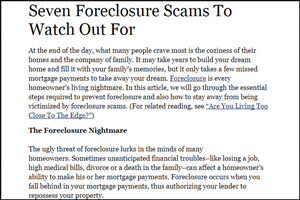Forclosure Scams
Foreclosure scams prey on homeowners in dire financial situations. By recognizing the signs and understanding the tactics used by fraudsters, you can safeguard your assets and avoid becoming a victim.
 Both locally and globally, scammers pose an ever-present threat to society. For the average individual,
losing money to these fraudsters is a devastating blow.
Many people find themselves blindsided as these swindlers siphon funds from their savings or other
financial accounts. From the affluent to the less fortunate, numerous
individuals have been victimized by these deceptive operators, who often operate from undisclosed
locations. These fraudsters adeptly conceal their true identities,
swiftly deceiving unsuspecting individuals.
Both locally and globally, scammers pose an ever-present threat to society. For the average individual,
losing money to these fraudsters is a devastating blow.
Many people find themselves blindsided as these swindlers siphon funds from their savings or other
financial accounts. From the affluent to the less fortunate, numerous
individuals have been victimized by these deceptive operators, who often operate from undisclosed
locations. These fraudsters adeptly conceal their true identities,
swiftly deceiving unsuspecting individuals.
With cunning, they might impersonate government representatives or senior executives to dupe the public. Their methodologies are diverse: from relentless email campaigns to intricate scams. The fluidity with which they alter their personas and tactics makes it incredibly challenging for individuals to pinpoint and avoid them.
In today's digital age, these fraudsters employ advanced technologies and social engineering techniques, capitalizing on the trust and lack of awareness of many. One must always be vigilant, as these malicious actors are constantly evolving their strategies to stay ahead of law enforcement and public awareness. Educating oneself about the common tactics and regularly updating personal cybersecurity measures can be the first steps towards safeguarding against such threats.
Foreclosure-related scams have been making headlines globally. Often, individuals who find themselves unable to fulfill their home loan repayments approach their banks seeking foreclosure solutions. Sensing opportunity, scammers capitalize on these situations. They acquire information about those seeking foreclosure and initiate contact, either through emails or phone calls. Posing as "foreclosure advisors" or "specialists", they skillfully establish trust with these unsuspecting individuals.
Over time, they foster a seemingly genuine relationship, making it easier to extract sensitive information. This might include financial account details, social security numbers, PINs, passwords, and other personal data. Once armed with this information, these fraudsters swiftly drain funds from the victims' accounts.
The realm of foreclosure fraud is vast, with various deceptive schemes being employed by these con artists. Being aware of the most prevalent tactics can be the first step in protecting oneself. As technology evolves and methods become more sophisticated, constant vigilance and regular education about emerging threats are paramount. Always remember to consult with trusted financial advisors and never share sensitive information without thorough verification.
Skimming
In this type of scam the perpetrators will contact the customers and show his interest to purchase the property for a price that is lesser than the market value. They will insist the seller to transfer the property in their names. Every action will be judicious and the victim will not be able to sense anything till he falls prey to them.
Internet and telephone calls :
In these types of scam the scammer will extract the vital information such as credit card number, passwords, pin and other such details of the people who default the loans. When the innocent victims provide these details they will swindle the money from the victims' bank account.
- To avoid falling into scammer's traps, defaulters must refrain from sharing any personal or financial details.
- It's essential to conduct background checks before communicating with unknown entities about sensitive matters.
- Under no circumstances should individuals disclose personal information, even when under significant pressure.
- Recently, a widely circulated scam involved foreclosure letters. For instance, an individual received a letter from "Foreclosure Fraud Prevention" warning of impending foreclosure unless immediate action was taken. However, upon consulting with their bank, the individual found the claim to be baseless.
- Scams related to rental foreclosure are on the rise. People need to be vigilant when receiving unsolicited emails or letters regarding foreclosure.
- Be wary of requests to wire money, especially for advance amounts or initial rental installments. These are often scams.
- With the growing popularity of scams concerning foreclosure defenses and alerts, the public should exercise caution when dealing with third parties and unfamiliar entities.
- Scammers might even impersonate government officials from Foreclosure Authorities, pressuring individuals to divulge critical information. Always verify the identity of such "officials" before proceeding with any discussion.




